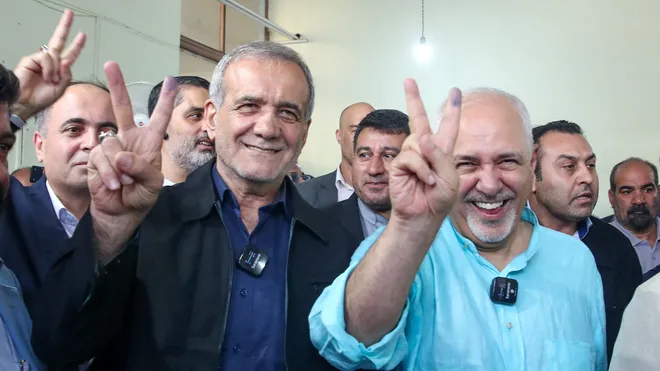By Girish Linganna
Masoud Pezeshkian, a reformist candidate, won Iran’s presidential election on Saturday, July 5. He defeated the hard-line candidate Saeed Jalili, securing over 53.3% of the votes from more than 30 million ballots. This snap election was held after the previous president, Ebrahim Raisi, tragically died in a helicopter crash in May.
Masoud Pezeshkian has promised to adopt a practical approach to foreign policy and to relax the strict enforcement of Iran’s mandatory headscarf law. His election comes after years of protests against the Islamic Republic.
Pezeshkian’s victory represents a shift away from the policies of Raisi, who was a close ally of Khamenei. Raisi had enforced stricter dress codes for women and adopted a tough approach in the stalled nuclear deal negotiations.
Reformist leader and heart surgeon Masoud Pezeshkian was born on September 29, 1954, in Mahabad, northwestern Iran. His father is Azeri, and his mother is Kurdish. Pezeshkian is a heart surgeon and a former health minister. During the Iran-Iraq war, he sent medical teams to the front lines.
Masoud Pezeshkian had previously run for president twice, in 2013 and 2021, but did not win. In 1994, he faced a personal tragedy when a car accident took the lives of his wife and daughter, leaving him to raise his three surviving children on his own.
After the death of President Raisi, the reformist group, led by former President Mohammad Khatami, came out of political isolation to support Pezeshkian. Pezeshkian, who speaks Azeri, Farsi, and Kurdish fluently, is the first president from western Iran in many years. His election is welcomed by those hoping for a more tolerant government, especially considering the area’s diverse religious and ethnic backgrounds.
“Even people who don’t pray support me,” Pezeshkian said during a recent presidential debate. However, this inclusive stance has led to xenophobic attacks from some of his opponents. Xenophobic means having or showing a dislike or prejudice against people from other countries or cultures. It describes attitudes, actions, or policies that are hostile towards foreigners or those perceived as different.
Iran’s Masoud Pezeshkian will take the oath of office before parliament in early August, becoming the country’s ninth president, state media reported on Sunday .
According to Mojtaba Yosefi, a member of parliament’s presiding board, the swearing-in ceremony for the new president will take place on August 4 or 5. The president will then have 15 days to submit his proposed ministers to parliament for approval, reported the official IRNA (Islamic Republic News Agency).
In Iran, presidents-elect must take an oath before parliament to officially assume office. The swearing-in ceremony occurs after the president-elect is officially endorsed by the supreme leader of the Islamic Republic.
As president, Mr. Pezeshkian will hold the second-highest position in the government and will have a say in both domestic and foreign policies. He will have the authority to set economic policies.
However, his control over the police will be limited, and he will have almost no authority over the Army and the Islamic Revolutionary Guard Corps (IRGC), which is the military’s ideological branch. The police, the Army, and the IRGC report directly to the supreme leader. Mr. Pezeshkian will be responsible for carrying out the policies set by Mr. Khamenei.
Iranians have mixed reactions to Mr. Pezeshkian’s victory. Some are happy, while others are skeptical. “We needed an educated president to fix the people’s economic problems,” said Abolfazl, a 40-year-old architect from Tehran who only gave his first name.
On the other hand, Rashed, a 40-year-old barber, said Mr. Pezeshkian’s win “doesn’t matter” and thinks the “situation will only get worse.” Maziar Khosravi, a political analyst and journalist, noted that the new President “did not promise an immediate resolution to problems” in Iran. “People voted for him because they saw his approach to interacting with the world was very different from the current government,” he explained.
Political commentator Mossadegh Mossadeghpoor mentioned that people are cautiously “hopeful that he can make some positive changes and resolve some of the country’s issues,” especially the economy, as reported by The Hindu.
Analysts believe Mr. Pezeshkian will face significant challenges because conservatives still control many state institutions. One key institution is parliament, elected in March, which is dominated by conservatives and ultraconservatives. Parliament Speaker Mohammad Bagher Ghalibaf, who competed in the first round of the election, supported Mr. Jalili in the run-off.
Two other ultraconservatives who withdrew just before the first round also threw their support behind Mr. Jalili. “Dealing with the hijab or other ideological issues is beyond the President’s control,” said Mossadeghpoor, emphasizing that these are religious matters. Ali Vaez from the International Crisis Group stated that Mr. Pezeshkian will encounter significant challenges in securing “social and cultural rights at home and diplomatic engagement abroad.”
Regarding the nuclear issue, Mossadeghpoor mentioned that Mr. Pezeshkian might be able to “resolve it if it aligns with the system’s will.” Efforts to revive the 2015 nuclear deal with Washington and Europe have stalled over the years. “No one should expect a fundamental change in Iran’s foreign policy,” said Khosravi.
Iran’s presidential election took place during increased regional tensions due to the Gaza war between Israel and Hamas, an ally of Tehran, which has involved other Iran-backed militant groups in Syria, Lebanon, Iraq, and Yemen. Mossadeghpoor stated that Mr. Pezeshkian will “neither reduce Iran’s missile capabilities nor stop supporting resistance groups.” (IPA)


